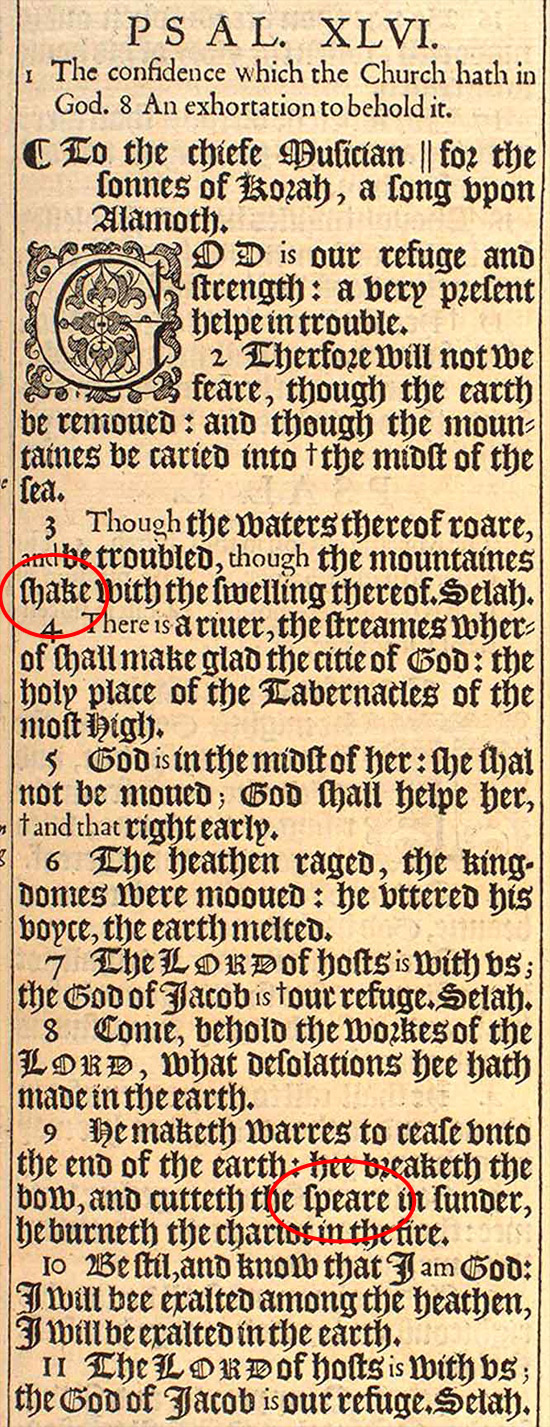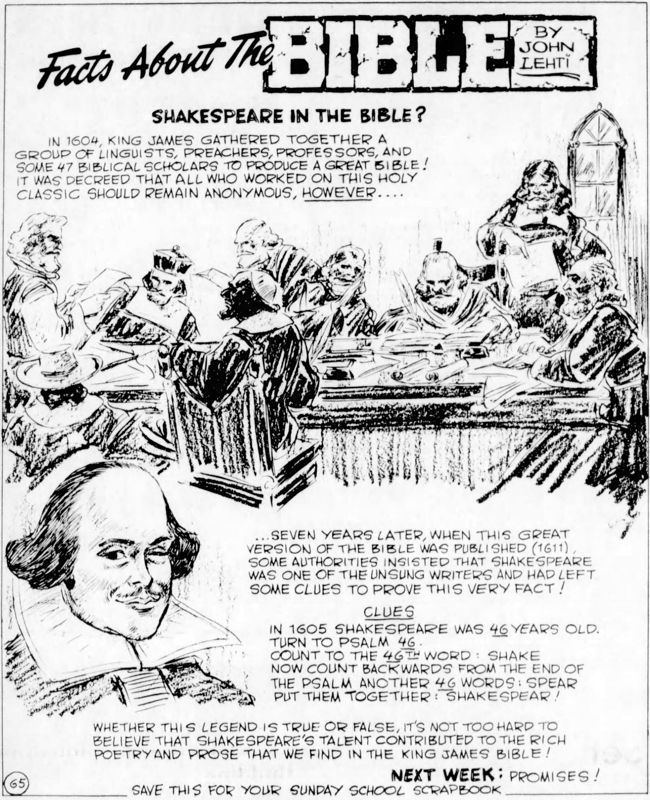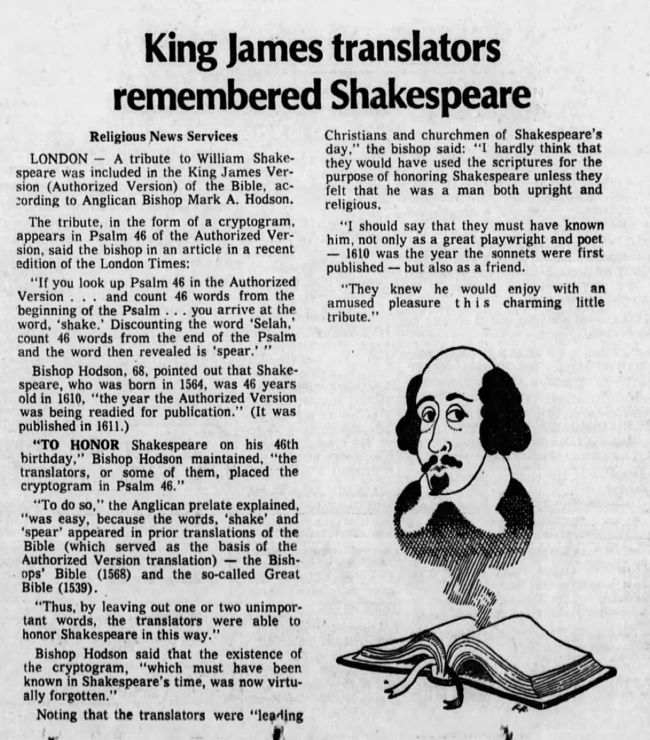Shakespeare and Psalm 46
In 1902, a person identified only as "a learned correspondent in West Hackney" brought to the attention of the world a curious fact about Psalm 46 of the King James Version of the Bible. The name "Shakespeare" seems to be coded into it.
As explained in a brief notice that ran in The Publishers' Circular (Jan 11, 1902):
In the original 1611 King James Bible, the word spear was actually spelled "speare," which contradicts the guy's point about the 4 consonants and spelling of Shakespeare's name.
However, his larger point remains true — that in Psalm 46, the word "shake" is 46 words from the beginning, and "speare" is 46 words from the end.
One theory is that this suggests that Shakespeare worked on the King James translation, and devised this way to leave his calling card. Kind of like a "Shakespeare was here" sign. Or maybe one of the translators was a fan of his.
Or perhaps it means absolutely nothing, and is just a weird coincidence. No one knows.
One more weird coincidence: Shakespeare was 46 in 1610, which is about when the translation was being completed.



As explained in a brief notice that ran in The Publishers' Circular (Jan 11, 1902):
DID SHAKESPEAR WRITE THE BOOK OF PSALMS?
'S.L.H.,' in the column of the Morning Leader headed 'Sub Rosa,' says that the following suggestion reaches him 'from a learned correspondent in West Hackney':—
'In the name Shakespear there are four vowels and six consonants..... If you write down the figure 4 and then follow it by the figure 6, you get 46.
Very well — turn to Psalm 46 and you will find that in it the 46th word from the beginning is "shake," while the 46th word from the end is "spear."
This fact, or rather these facts, may be held to prove, according to my correspondent, that the Psalms were written by Shakespear and that this is really the correct way of spelling his name.
I know that controversialists are a fierce tribe and they stick at each other as well as nothing, and so they will try to make out that the word "spear" is the 47th and not the 46 word from the end of the 46th Psalm; but this can only be done by counting "Selah," and if you think I am going to throw over a valuable literary discovery for the sake of an odd "Selah" you are mistaken.'
'S.L.H.,' in the column of the Morning Leader headed 'Sub Rosa,' says that the following suggestion reaches him 'from a learned correspondent in West Hackney':—
'In the name Shakespear there are four vowels and six consonants..... If you write down the figure 4 and then follow it by the figure 6, you get 46.
Very well — turn to Psalm 46 and you will find that in it the 46th word from the beginning is "shake," while the 46th word from the end is "spear."
This fact, or rather these facts, may be held to prove, according to my correspondent, that the Psalms were written by Shakespear and that this is really the correct way of spelling his name.
I know that controversialists are a fierce tribe and they stick at each other as well as nothing, and so they will try to make out that the word "spear" is the 47th and not the 46 word from the end of the 46th Psalm; but this can only be done by counting "Selah," and if you think I am going to throw over a valuable literary discovery for the sake of an odd "Selah" you are mistaken.'
In the original 1611 King James Bible, the word spear was actually spelled "speare," which contradicts the guy's point about the 4 consonants and spelling of Shakespeare's name.
However, his larger point remains true — that in Psalm 46, the word "shake" is 46 words from the beginning, and "speare" is 46 words from the end.
One theory is that this suggests that Shakespeare worked on the King James translation, and devised this way to leave his calling card. Kind of like a "Shakespeare was here" sign. Or maybe one of the translators was a fan of his.
Or perhaps it means absolutely nothing, and is just a weird coincidence. No one knows.
One more weird coincidence: Shakespeare was 46 in 1610, which is about when the translation was being completed.


The Gaffney Ledger - Jan 4, 1980
note: Shakespeare was 46 in 1610, not 1605.

Arizona Republic - May 15, 1976
Comments
"perhaps it means absolutely nothing"
DING! DING! DING! We have a winner, folks.
DING! DING! DING! We have a winner, folks.
Posted by A Nonny Mouse on 08/31/16 at 08:41 AM
This is the same kind of b.s. thinking used to show that Ronald Wilson Reagan was really the AntiChrist of Revelations from the christian Bible. The reasoning stems from the fact that each part of Reagan's given name has six letters each. And of course, three sixes in a row is the Mark Of The Beast!
Quod Erat Demonstrandum
Quod Erat Demonstrandum
Posted by KDP on 08/31/16 at 09:06 AM
Oh, ye of little faith....
Posted by Expat47 in Athens, Greece on 08/31/16 at 11:08 AM
I don't hold with the numerology part (four vowels, six consonants), but the hiding his name in the text is just the sort of thing I'd expect from someone like Shakespeare. I wonder if anyone has ever done a search for other names hidden in the same way -- with decent computer skills, it shouldn't be too difficult. (I admit I'm not a Bible scholar, so I don't know if the word 'bacon' is anywhere in scripture, but that's the first thing I'd look for.)
Posted by Phideaux on 08/31/16 at 11:33 AM
The bible can be very confusing. It's composed of a number of different documents sort of tossed together into two acts. The Old and New Testaments. Now in the old days prior to word-processing, good grammar and spellcheck each document was hand copied by scribes who were often illiterate. They could copy but did not understand what they were copying so a mistake here and poor copy there led to changing the meaning of the documents. When things finally were consolidated from all the fragments and translated multiple times, often the original story was lost. Then the group paying for the bibles, well they had to express their views since they paid for it. Since King James was footing the bill perhaps he insisted it say what he wanted and perhaps he enjoyed Shakespeare's wit and humor and let him in on the revision team. So the Bard had to get his name in one way or another.
Posted by Gator Guy on 08/31/16 at 07:54 PM
Yeah, 'cause there wasn't any Bible in ancient Hebrew that had to be translated relatively accurately, they could just put any words they liked in there...
If this is intentional, which I doubt, whoever did it got bloody lucky that the words were there in that very Psalm to be fudged into place. If Shakespeare had been called Shakesword, no dice: no swords are mentioned in either the 37th or the 73rd Psalm. (And yes, the spear, or "spears" depending on translation, is present in other languages as well.)
If this is intentional, which I doubt, whoever did it got bloody lucky that the words were there in that very Psalm to be fudged into place. If Shakespeare had been called Shakesword, no dice: no swords are mentioned in either the 37th or the 73rd Psalm. (And yes, the spear, or "spears" depending on translation, is present in other languages as well.)
Posted by Richard Bos on 09/03/16 at 03:06 PM
Commenting is not available in this channel entry.

Category: Conspiracy Theories and Theorists